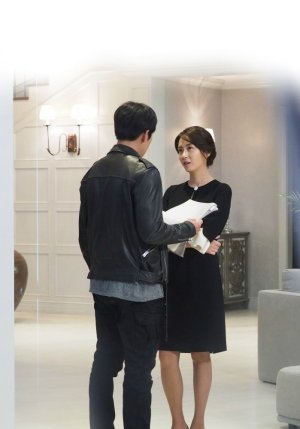
A Masterpiece depicting, age, relevance, neglect, death, and friendship.
A tale about beginnings and endings wolven intricately with complex subjects such as neglect, one's relevance, one place in the world and the awareness of one's demise. This is a short 1 hour tv movie. Though it discusses many such heavy topics, It is deceitfully light. The storytelling is innocent but deep. The movie will surely leave a deep impression on any one even if they don't understand the words. The acting is charming, conveying most of the characters through body language and expressions. This story hardly "tells" the viewer anything. Everything is instead shown through subtle actions and situations. Two people who each represent the beginning and the ending meet a pregnant women, while one unavoidably accepts their that their time has passed while the other, though just staring is bitter, but still marvels at this prologue of sorts. It may seem like a straightforward drama about a young boy and an old man coming together and learning to accept each other, it is however much more than that. Through their nonsensical almost borderline childish adventure, there is always a background sense of a shadow, Shota's childish outbursts at rejection, Jun-chan's health giving in despite his will, there is always a sense of foreboding throughout the journey. Generational divide is showcased organically. While both parties are in constant conflict as they are at opposite spectrum of life, they are at the same time similar in how neither can connect with the current time period. The movie covers so many themes in the span of an hour but never feels heavy. It is a breeze. This is truly a masterpiece which deserves way more attention.Was this review helpful to you?
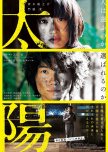
This review may contain spoilers
Fun and fascinating, occasionally thrilling, and ultimately invigorating.
Yu Irie directs a talented cast led by Ryunosuke Kamiki (As the Gods Will, BAKUMAN) in this quietly riveting, suspenseful drama about humanity at the brink of desperation. Challenging to watch at times, The Sun is not afraid to explore the tensions and inhibitions of a society at breaking point.The world building and characterisation are superb and never feel heavy-handed. We’re exploring some familiar allegories, but the Japanese setting produces a fresh take on the traditional versus technological. The Nox are productive and technologically capable, yet they are more rigid and emotionless. Despite their smiles they seem almost brainwashed. On the other hand the Curios live in quaint Japanese countryside towns abundant in nature and steeped in tradition. They live in a more natural world, and the only negative influence on their way of life happens to be the bureaucratic hold of those who’ve taken power for their own.
The technical side of the production is equally flawless, and oftentimes the cinematography is breathtaking. One scene in particular pulls out all the stops, a one shot which utilises every element of filmmaking to progress the story and tie together a number of narrative threads in a seamless and thrilling way. Tetsuhiko’s uncle returns to the village years after murdering a Nox guard, tainting the name of the village and making its people a target for the dominant group. At the same time Tetsuhiko arrives home with a wounded Nox, a young man he’s been befriending as he plans to enter the lottery. It’s hard to describe without spoilers, but as the two threads clash we see character blocking, camera movement, framing, quadrants and planes all employed pitch-perfectly. It’s cinematic magic.
The Sun delivers as a gripping and relatable story with a post-apocalyptic sci-fi flavour. Fun and fascinating, occasionally thrilling, and ultimately invigorating.
Was this review helpful to you?

This review may contain spoilers
Many wise sayings that touch your heart!
I watched the taiga drama for the first time!(Although it was a rebroadcast.) I
was able to learn the history of the Olympic Games , and I
was struck by the sudden appearance of stories scattered on multiple axes here and there.
What impressed me was
Stockholm with two people and
Berlin during the war. ..
It was said that the audience rating was the lowest and the worst record was updated, but from the perspective of those who saw the whole story in real time, it was the best!
After overcoming the Great Kanto Earthquake, World War, etc., Kokontei Shinsho will continue to talk about what sports are, featuring Shizo Kanakuri and Masaji Tabata!
Many wise sayings that touch your heart!
A ridiculous amount of information and vivid portraits. What's happening in Kudokan's head? Not only the script but also the direction and the actors are wonderful. No throwing away.
Was this review helpful to you?
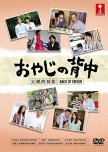
This review may contain spoilers
It’s a gem
I wasn’t planning to watch this but then I saw subtitle for first episode released so I asked myself, why not?To my surprise, this is actually quite good. . Oyaji no Senaka or Father’s Back will feature 10 episodes about fathers and their sons and daughters. So we can expect different casts for each episode.
First episode is about Hitomiko (Matsu Takako) and Kei-san (Masakazu Tamura) as daughter and father. Hitomiko is 35 years old and single. She still lives together with her father. At first, the scene in the beginning confused me a bit because Hitomiko never calls her father as “Otousan”, instead she calls him by name “Kei-san”. Likewise, Kei-san also addresses his daughter in an unusually polite way “Hitomiko-san”. I thought for a second that they’re not blood-related at first.
That was so sweet! Kei-san’s workplace and Hitomiko’s are nearby so whenever it’s time for lunch, he’ll go outside and waves at her who will be watching by the window.
One night, Kei-san was admitted to the hospital for food poisoning. Then we see Hitomiko starting to get panic attacks at home alone.
Kei-san woke up in the middle of night at the hospital but rushed back because he was worried about his daughter.
Just from this one episode of attack, I’m now realizing the huge responsibility as a father for Kei-san. I can’t help but wonder this – what if he’s gone one day? Who will take care of Hitomiko?
Then out of a sudden Kei-san said he’s going out on dates with this nurse at the hospital. Hitomiko also said she might try to go out with someone at her company who’s been chasing after her (not to mention that guy even divorced in order to ask her out lol).
But actually, the dates are lies. I know Kei-san probably lied because he knows Hitomiko can’t live with him forever. But he’s also worried about his daughter’s condition.
So this led to a misunderstanding where Kei-san met up with the guy he thought was dating his daughter (with the intention of marriage) and asked the guy to take care of Hitomiko.
Hitomiko on the other hand also met up with the nurse and asked the same thing for her father. They only found out about each other’s lies.
A year later, finally Hitomiko found someone she likes.
We’ve heard and watched tons of movies/dramas about motherly love. When it comes to fathers, I find they way they show love towards their children differently, especially with Asian parents, it’s much more subtle. But one thing is for sure, every parent just wants their children to grow up well and find happiness. Hitomiko can’t rely on her father for comfort forever and even if Kei-san wanted to be there for his daughter anytime, he can’t. I’m glad she found someone else to rely on.
Finally they showed why Hitomiko and Kei-san calls each other the way they do. After the accident that took away her mother, Hitomiko took her mother’s role and started cooking/household chores and etc..she wanted to give her father the feeling like their mother is still around, like the past.
Was this review helpful to you?

Lingering Thoughts
Junichi's last smile made me cry. Till the end, it was unclear whether he was dominated by Kyogoku or was it just his own hidden personality surfacing, but the performance was wonderful. Many questions remain, like what happened to why did the violent Junichi, who had been sealed under the depths of the mind awaken. Why does he not have any relatives.The world created by the actors was wonderful, and five episodes have passed in no time.
Kamiki especially showed restrained madness, each delicate express, the fingertips. He did not miss a beat.
This drama gave me a lot to ponder about. This interpretation of the drama is both kind and painful,
and the warm days between Junichi and Megumi are so lovely that the
lingering sound remains causing the tears have overflowed. For what has been lost.
The drama much like the relationship keeps lingering in the thoughts.
If your personality makes you violent, what is the cause?
Did I go crazy because I couldn't save myself or was it caused little by little after each restraint.
Well, there are many questions, but it's a very good work. I cried because of a drama after a long time.
Was this review helpful to you?
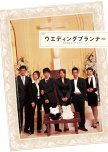
A well-cast and well-executed dorama!
A thoroughly enjoyable jdorama with a strong emphasis on character development. Plots were well written culminating in a satisfying but anticipated ending. Characters were quite endearing and the cast did a great job portraying them with laughs interspersed throughout. The advice meetings seemed a bit out of place I found but did give the drama some 'spicing up'. A well-cast and well-executed dorama!Innitially I didn't think much of Wedding Planner. The premise seemed lame and the lead actor reminded me of this annoying guy in my high school. I thought the girls were even worse. However, for some reason I held onto the show for over a year and on a whim started watching one day. It follows the standard episodic frame of most doramas, but it just does it in a more interesting and hillarious way. What really made this show stand out, was when Toru would go home for dinner. His family was absolute comedy - they should consider making a show about them. Episode 8 was probably the single funniest episode of a show I've seen in a long time... if you had to watch only one ep, watch that one. Overall, I give it an 9. You'll laugh, you'll cry (if you're a girl), and Ito Aymumi is kinda hot!
Was this review helpful to you?
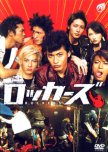
Burst City representing arguably the definitive record of the spirit and energy of the movement.
Filmed documents of the Japanese punk scene of the late 1970s and early 80s are rare items indeed. What exists is nearly all the product of the illustrious Sogo Ishii, who made several handfuls of short films, features and concert films during the period, many of which are populated by the country's various punk rock exponents, with 1982's astonishing Burst City representing arguably the definitive record of the spirit and energy of the movement.Of the many bands that took part in Ishii's cinematic celebration of punk rebellion, The Rockers were among the most spotlighted, their frontman Takanori Jinnai playing one of Burst City's main characters. Pale-faced and goblin-like, Jinnai's vivacious performance was only the start of an extensive career as an actor and media personality, one that properly kicked into gear when The Rockers split up not long after filming was completed.
Formed in 1977 in Hakata, North Kyushu (also home of the bands The Roosters and ARB, the latter fronted by Ryo Ishibashi of Audition fame), The Rockers followed the life cycle so typical of punk bands of any nationality, lighting up like a flare before quickly bursting apart. The five-piece band recorded three albums between 1980 and 1982 ('Who', 'Come On', and 'Shakin'') before hanging up their guitars and their leathers, and moving on to a variety of fates. Jinnai's two-decade acting career saw him appearing in the likes of Satoshi Isaka's The Frame (Hasen no Marisu, 1999) and Hiroyuki Nakano's Red Shadow (Akakage, 2001), and winning Best Actor accolades at the Japanese Academy Awards on no less than two occasions. He made his directorial debut in 2001, helming the Running Free segment of the omnibus film Tokyo Zance, produced by fellow musician Tsunku.
Although moving on to directing a feature would seem a logical next step in this process, when you realise Jinnai's debut film is in fact a heavily fictionalised version of the story of his own band The Rockers, the affair gains an extra dimension; it's probably a world first that the singer of a rock band should direct a fiction film about his own group, twenty years after the fact. They may have consciously lived through the times, but Alex Cox wasn't a member of The Sex Pistols and Oliver Stone was certainly never a part of The Doors. Aside from the question if they would even be capable of it, would actual band members even have enough distance from their own past to direct an effective adaptation of their own life stories?
Distance is certainly not something we need to worry about when it comes to Rockers. Rather than trying to be as precise as possible, Jinnai went in the opposite direction; as the absence of an article in the title suggests, this is not a factual retelling of the life and career of The Rockers. The director / frontman threw authenticity out the window and decided to capture the spirit and atmosphere of the band's early days before record companies came calling. Except that this is not the same band and these are not the same early days. Don't expect period detail; this film is to all intents and purposes set in the present, and the word 'punk' is noticeable only for its complete absence.
So, should we be disappointed then? Is this Jinnai's attempt at whitewashing his own history or perhaps even a simple case of total misfire? None of the above, I'm happy to report. What we have here is a director taking heaps of inspiration from his own past to deliver a most satisfying commercial comedy, one filled with gleeful amounts of self-mockery. Jinnai pokes fun at himself and his fellow Rockers, portraying the band as a quartet of losers and nerds whose stage act wouldn't fill a backroom, let alone an entire club. Jin, the director's own effigy played by Nakamura, still lives at his parents' house where he lip-synchs to rock 'n' roll records. Guitarist Ko-chan (Tsukamoto, representing bleached-haired Rockers stringman Hitomi Tsurukawa) is a mess of sexual repression after a childhood at the mercy of two older sisters eager to use him as a guinea pig for their make-up skills. Bassist Gaku-chan (Ryuta Sato, representing original four-stringer Jinkichi Anai) keeps a bucket ready in the wings for whenever his nerves get the better of him, and drummer Momo-chan (Okada in the role of Yoichi Funakoshi - and note all the cute and decidedly un-rock-like nicknames) is doomed to forever carrying the botched childhood attempts at self-tattooing.
It's not until this foursome is forced to look for an additional guitar player after Jin's dad burns his Stratocaster (followed by a vision of Jimi Hendrix at Monterey), that attitude and musical ability enter into the equation. Leather-clad, shade-wearing Tani (Tamaki), inseparable from his black Les Paul, is introduced as the king of R'n'R cool and Jinnai keeps him firmly seated on his throne throughout the film, retroactively proclaiming the guitarist, rather than himself, as the band's true hero (not coincidentally, he is the only band member referred to by his real name).
Freed from the need to be factual, Rockers leaves the audience free to judge it entirely on its merits as a film. With a tried and true rags-to-riches plot containing more than its share of idiosyncrasies, Rockers is a film that will please even the most uninitiated of viewers, its excellent expressive and energetic performances (the band's entire rhythm section consists of actors from the not dissimilarly spirited Kisarazu Cat's Eye TV series, penned by GO, Ping Pong, and Zebraman scribe Kankuro Kudo) making it a rewarding experience even for unsubtitled gaijin viewing (you won't be alone in this either, since most Japanese probably won't catch a good part of the dialogue due to the thick Hakata accents employed throughout).
It may not offer any insights into the history of the Japanese punk music scene and even similarities with the band that inspired it are superficial at best, but Rockers transcends that admittedly narrow focus to become a film of with a more universal appeal. With his debut film, Takanori Jinnai has delivered, quite simply, one of the year's pleasant surprises.
Was this review helpful to you?

